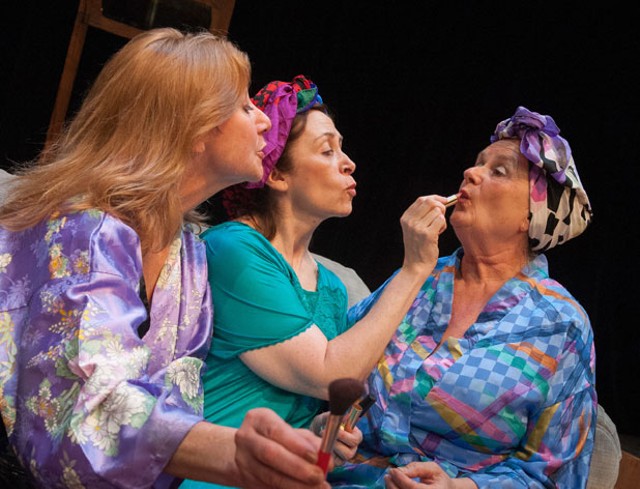Published July 17, 2013 at 5:58 a.m.
The Cemetery Club, now playing at Lost Nation Theater in Montpelier, dramatizes two possible responses to a good thing. You can enjoy something pleasant but reach a point where you’ve had enough. And isn’t it wonderful to be so content? Or you can stay hungry and enthusiastic. And isn’t it wonderful to keep wanting more?
When this distinction arises in Ivan Menchell’s 1990 play, the three main characters are deciding on another glass of wine, but their choices parallel a much larger theme: how we face the reality of growing old. Can we enjoy the feeling of having enough, or should we continue to seek something new?
The three women have known each other for years; now that they’ve all reached widowhood, they make a monthly trip to the cemetery to visit their husbands’ graves. The social ritual connects them, but also invites wisecracks about how each is handling moving on and what it means to want more.
Doris (Maura O’Brien) defines contentment: Her husband’s memory is enough for her, and she channels her energy into indignation about the cemetery’s lousy upkeep. She also focuses a share of it on Lucille (Jude Milstein), whose swaggering accounts of her success on the geriatric dating scene scandalize Doris. Lucille hunts for clothing bargains and men with equal gusto and considers all of it invigorating payback for her deceased husband’s infidelity.
At first, Ida (Emme Erdossy) is as frozen in time as Doris is, but she begins to wonder if it might finally be time to say good-bye to the monthly cemetery visit and leave room for “the next chapter.” Sam, the neighborhood butcher, coins that phrase to describe his own efforts to get over the loss of his wife. To Lucille, this eligible bachelor is a possible conquest. To Doris, he’s a scoundrel on the prowl and can’t be trusted. To Ida, he might be the man she’s ready to let into her life.
Menchell’s play is specific as to era, location and character. These are Jewish widows living in the upper-middle-class Forest Hills neighborhood of Queens, N.Y. It’s 1987, and if we delicately determine the ladies to be about 70, we can estimate they married between the Depression and World War II.
LNT’s Vermont production of The Cemetery Club lacks some of the rich Jewish texture and the nuances of Forest Hills. Menchell’s script emphasizes the ritualistic repetition and loving insults that require a Jewish upbringing to deliver. An accent isn’t enough. Though the actors all make largely plausible efforts to capture the dialect, there’s a vast difference between mimicking Jewish speech and inhabiting a Jewish character. The telling detail is not just the delivery but the response. Missing here are the world-weary shrug and the perfect timing of the comeback. The Jewish voice in which Menchell writes has all the time in the world; in this production, the actors gallop at shiksa speed.
Still, most of the humor survives quite well, and the cast of fine performers has many other assets. The production is polished and entertaining, and the audience on opening night seemed to connect with the warmth the actors sought to share.
Menchell’s script has some ambitions as a meditation on friendship and the nature of grief, but his characters ultimately remain superficial because he moves on after giving them only brief scenes that challenge them. The first act tries so hard to please that it soon is huffing and puffing toward exhaustion. Then the playwright uncorks a second act with real strength and several surprises. The Cemetery Club is not a forgettable comedy, but one with power to touch the audience, even if it resorts to caricature at times.
Director Tara Lee Downs keeps the pace brisk as the actors lob one-liners. It’s the right kind of direction for this material and keeps the audience laughing. Even so, after a while we may notice that the zingers fly but never really land. Lucille and Doris, at odds over how to handle widowhood, jab at each other. But it’s not their friendship that keeps the punches from hurting; the actors just don’t register them. For the play to come fully alive, we need to see the love and trust these dear friends have forged revealed in the teasing that connects them.
Erdossy’s performance as Ida gives the play that kind of soul. As an actor, she’s mastered the ability to listen onstage — and that’s no passive accomplishment. Engaged in what’s taking place around her, she not only portrays her character but gives the others a foundation for their own work. The story calls for Ida to choose between Lucille’s manhunt style and Doris’ noble withering away. Ida seeks a life-affirming path down the middle, but to get there she’ll have to revisit all the turmoil and anxiety of dating. Erdossy captures Ida’s schoolgirl panic as she frets about her makeup, then turns on a dime to immerse herself in a mature woman’s disappointment.
O’Brien wisely makes the stoic Doris more smart aleck than silent sufferer. This puts Doris on equal footing with Lucille, and gives Ida two strong voices to heed. O’Brien has great strength onstage, from the vocal power of her broad accent to her skillful physical awareness and movement. Her only fault may be selling the laughs too hard at times, trying to win us over by force.
As Lucille, Milstein romps through comic poses while unleashing the play’s main reservoir of wit. Milstein has a comedian’s courage to take the risk of appearing a bit out of control, and she would probably stomp her way across the Arctic to deliver a punch line. This level of energy is entertaining, but it’s also akin to watching fireworks: There’s plenty of color and light, but little depth of character and limited connection with others onstage. Milstein delights audiences because she deploys her skills so well, but her talent might lend itself more to standup comedy than to ensemble acting.
In a nice contrast to the loudmouth ladies, Robert Nuner plays Sam quietly, making him something of a delicate flower who’s unsure of his way in the elderly dating scene. Onstage, Nuner has great elegance, sharp comic timing and dry wit.
Marsha Gillette makes the most of her small role as an interloper. She’s bold enough to shake the three friends from complacency and has just enough depth to elevate her own character from mere plot point.
Donna Stafford’s set design is nicely textured, including a piano with a cluster of photos on top that swiftly evokes class and period. For most characters, Cora Fauser’s costumes err on the side of frumpy. Her bolder, brighter choices for Ida may suit the character but don’t jibe with Ida’s drab living room décor.
Erdossy, Milstein and O’Brien have wonderful energy, but on opening night their chemistry hadn’t quite jelled. Downs is perhaps too keen to sell the comedy to the audience, and the result is performances that are aimed outward before the characters have had time to build their relationships. But these skilled actors are likely to grow into their roles during the run, releasing the full potential of this warm, humorous play.
"The Cemetery Club" by Ivan Menchell, directed by Tara Lee Downs, produced by Lost Nation Theater. Thursday through Sunday, July 18 to 28, 7 p.m. on Thursdays and Sunday, July 21; 8 p.m. on Fridays and Saturdays; and 2 p.m. on Sunday, July 28, at City Hall Auditorium, Montpelier. $15-30. Info, 229-0492. lostnationtheater.org
More By This Author
Speaking of...
-

Executive Director Kurt Thoma Leaves Barre Opera House
Mar 5, 2024 -

Vermonter's Musical Bound for Broadway With Hillary Clinton as a Producer
Oct 25, 2023 -

Phantom Theater Finds New Winter Venue in Waitsfield
Oct 13, 2023 -

Double E 2023 Summer Concert Series Kicks Off With the Wailers
Mar 17, 2023 -

Off Center for the Dramatic Arts to Reopen in the New North End
Sep 23, 2022 - More »
Comments
Comments are closed.
From 2014-2020, Seven Days allowed readers to comment on all stories posted on our website. While we've appreciated the suggestions and insights, right now Seven Days is prioritizing our core mission — producing high-quality, responsible local journalism — over moderating online debates between readers.
To criticize, correct or praise our reporting, please send us a letter to the editor or send us a tip. We’ll check it out and report the results.
Online comments may return when we have better tech tools for managing them. Thanks for reading.













































